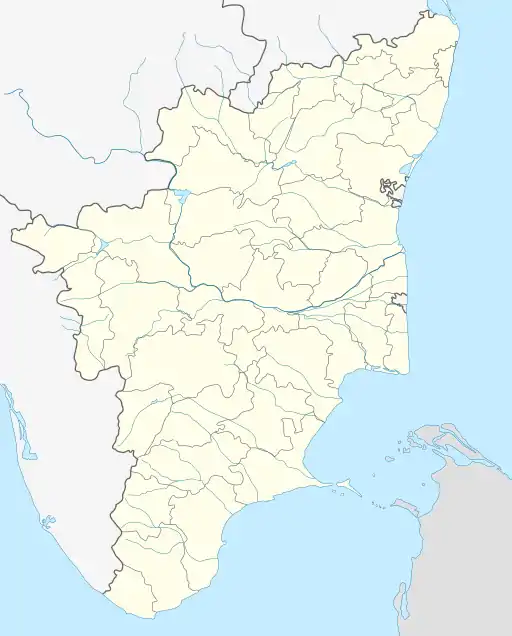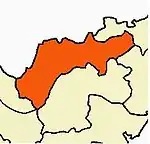Kaveripakkam
Kaveripakkam is a town panchayat in Ranipet district in the Indian state of Tamil Nadu.
Kaveripakkam | |
|---|---|
Town | |
| Nickname(s): Kaveripauk | |
 Kaveripakkam Location in Tamil Nadu, India | |
| Coordinates: 12.901667°N 79.463889°E | |
| Country | |
| State | Tamil Nadu |
| Region | Ranipet |
| District | Ranipet |
| Talukas | Nemili |
| Elevation | 160 m (520 ft) |
| Population (2011)[1] | |
| • Total | 14,583 |
| Languages | |
| • Official | Tamil |
| Time zone | UTC+5:30 (IST) |
| PIN | 632 508 |
| Telephone code | 04177 |
| Vehicle registration | TN-73 |
| Lok Sabha constituency | Arakonam |
| Vidhan Sabha constituency | Sholinghur |
| Other Languages | Telugu, Urdu |
Demographics
As of the 2011 India census,[2] Kaveripakkam had a population of 14,583. Males constitute 50% of the population and females 50%. Kaveripakkam has an average literacy rate of 72%, higher than the national average of 59.5%: male literacy is 79%, and female literacy is 64%. In Kaveripakkam, 9% of the population is under 6 years of age.
Attractions
Kaveripakkam is a tourist spot known for a lake built by King Nandivarman III of Pallava dynasty. This place was called 'Kavithapakkam' during the reign of the Pallavas. Recent excavations have unearthed 16th century artifacts such as pottery materials and burnt clay products. These artifacts are now displayed at Government Museum in Vellore.
Kaveripakkam lake is the second largest lake in Tamil Nadu. This lake irrigates more than 30 villages. This is the main tourist spot.
Sholingur Narasimha Temple in Sholingur is 25 km away. Puduppadi, Panapakkam and Natteri are places in the neighborhood.
Kaveripakkam is 40 km from Vellore and 78 km west of Chennai International Airport. The nearest rail access points are Walajah Road Junction Railway Station and Sholinghur Railway Station.
Location
On the northern banks of the Palar River, Kaveripakkam is a town in Ranipet District of Tamil Nadu. This town, also known as Kaveripak, is 10 km east of Walajapet and 30 km from Kanchipuram.
Kaveripakkam is about 100 km west of Chennai, 40 km east of Vellore and 28 km west of Kanchipuram. Kaveripakkam has more than 50 small villages around the town. Kaveripakkam is the entry town of Vellore Dist
- Nearest airport: Chennai
- Nearest seaport: Chennai
- Nearest railway station: Sholingur (Banavaram), Walaja Road
- Nearest railway junction: Katpadi, Arakonam
- Buses via Chennai to Vellore, Chennai to Arcot, Chennai to Thirupathur, Chennai to Ambur, Chennai to Gudiyatham as well from Tambaram and Kanchipuram will go via Kaveripakkam.
Education
Colleges
- Matheri Teachers Training Institute
- Kaveripakkam College of Arts & Science
- Shri Sapthagiri Institute of Technology
Schools
- Government Boys Higher Secondary School
- Government Girls Higher Secondary School
- Saraswathi Vidhyalaya Matric Higher Sec School, kaveripakkam
- Swamy Vivekananda Vidyalaya Matric School
- DGR Matric Higher Sec School
- Vedavalli Vidhyalaya Hr.sec school, Bagaveli
- NAG Matric Higher Sec School & NAG Vidyashram (CBSE) Sr.Sec.School, Sumaithangi
- Anne Marie Matric Hr.Sec. School, Thiruparkadal
- Golden Growth Vidyalaya CBSE
Crops
Plantain is the most predominant crop in Kaveripakkam followed by rice and sugarcane. Banana fruit and banana tree products are very famous all over the district and state. Till about 70/80 years back betel leaves and Agathi leaves used to be grown in abundance.
History
The war between Raza sahib and Robert Clive was held at this place. This is a well known war between British East India Company and Arcot Nawab. Raza sahib lead 7000 soldiers as a chief commander of Arcot Nawab's army. British forces were led by Robert Clive with 500 soldiers. But with new techniques and new weapons Robert Clive defeated Raza Sahib.
Elders used to tell stories of naming of some villages around Kaveripakkam. After winning a war a king's body was cut into pieces and thrown at different places around the town. The place where liver was thrown was called Eirala cheri (Eiral means liver in Tamil). The other names were Uthirampattu (Uthiram means blood), Sirugarumbur and Perugarumbur after sirukudal (small intestine) and perukudal (large intestine).
During the war periods valuable statues were buried in land near the Shri Sundara Varadharaja perumal temple. The archaeology department found many statues near this temple. Recently a few statues were found during temple renovation.
Apart from above temples, some other small temples are present. In old temples, we could see lot of notable Tamil scripts. Here the ancient note is present on gods.
Notable residents
Ariyanatha Mudaliar, the Prime Minister of Krishnadevaroya was born in Kaveripakkam.
Important Temples
- Shri Azhagiya Ramar Temple: This is very old temple built for Lord Rama.
- Shri Sundara Varatharaja Perumal Temple: It has been believed there is a secret subway leading to Vellore fort from this temple. There is a window in the wall of the main sanctum and is said to be carved in single stone. The designs of the window is different in both the sides which is very rare case in single stone window.
- Sri Prasanna Venteswara Temple: Ancient temple that is also called 63 Thirupathi in Tamil Nadu.
- Sri Pancha Lingeshwara Temple: Swayambu linga known as Pancha Lingeshwara is representing pancha boodha.
- Moolaththu Vazhiyamman Temple: This is newly built temple for the goddess Amman. This is the only temple which has chariot festival (தேர் திருவிழா). But it has been stopped recently due to some issues.
- Muktheesvaran Temple: Saneeshvara Bhaghavan present in this temple and devotees be visit with ghee lamps for nine weeks to get blessings and to avoid the bad impact of saneeshvara dhosham. A lot of small gods are present in this temple.
- Konganeeswarar Temple: A big pond is present near this temple. Excess water from Kaveripakkam lake reaches this pond during rainy seasons which indicates that lake has reached its actual capacity.
- Shri Dhrowbathy Amman Temple: This temple is very famous for its festival celebrations. Huge celebration are conducted in this temple to Panjali (Goddess in Mahabharat). Drama and other cultural activities are celebrated for one month. Mahabharat will be read by famous scholars in that month. This is the temple which has numerous cultural activities compared to other temples in Kaveripakkam.
- Shri Culcutta Kaali Amman Temple: This temple is for Kaali and present in national highways. Most of the vehicles will be stopped here for pooja and believed that Kaali will save them on the way from all troubles.
- Shri Chelli Amman, Shri Kaveri Amman, Shri Durgai Amman ocheri amman and Shri Kanni Amman Kovil temples:These temples are little small and very powerful and famous for their festival celebrations (ஆடி திருவிழா).
- Shri Angala Parameshwari Temple: This temple is built for the Goddess Angalamman and some special ceremony at graveyard will be conducted every year (மயான கொள்ளை ). People will take Amman from the village to graveyard and will be doing pooja to worship the goddess.
- Sri Shirdi Sai Baba Temple: This is newly built temple for the god Shirdi Sai Baba.
- Arulmigu Vazhithunai Vinayagar Temple: When u step in to the town from bus stand first thing u can see is this temple, built in 1990. Neem Tree and Peepal Tree grown together by nature, is believed as a Suyambu amman.
- Umaiyaselvi Amma Temple: this temple is placed in Thuraiperumpakkam village which is 5 km away from Kaveripakkam, This temple is very famous for the Pournami pojai unjalsevai which is conducted on every month Pournami night. Also every year Addi maasam palkodam festival will be celebrated whereas neighbour village people will also participate in this Polkodam festival.
- Agilandishwari Udanurai Ayeneshwarar Temple: this temple is placed in Thuraiperumpakkam village which is 5 km away from Kaveripakkam, This is very oldest temple which was built on 750 years ago.
References
- "Census of India 2011: Data from the 2011 Census, including cities, villages and towns (Provisional)". Census Commission of India. Archived from the original on 16 June 2004. Retrieved 1 November 2008.
- "Census of India 2001: Data from the 2001 Census, including cities, villages and towns (Provisional)". Census Commission of India. Archived from the original on 16 June 2004. Retrieved 1 November 2008.

